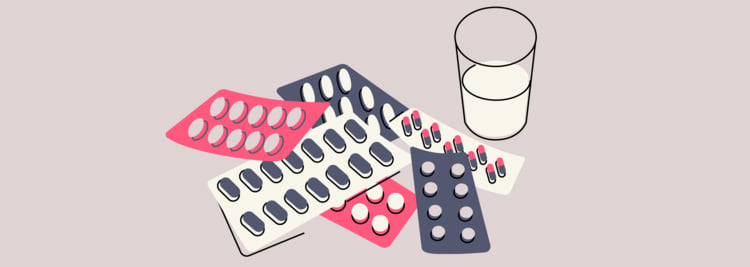A urinary tract infection (UTI) is uncomfortable, annoying, and potentially life-threatening, if ignored. But once you’ve sought treatment, can UTI symptoms linger after antibiotics? Learn more about what to do when these symptoms persist after you’ve started taking medication.
-
Tracking cycle
-
Getting pregnant
-
Pregnancy
-
Help Center
-
Flo for Partners
-
Anonymous Mode
-
Flo app reviews
-
Flo Premium New
-
Secret Chats New
-
Symptom Checker New
-
Your cycle
-
Health 360°
-
Getting pregnant
-
Pregnancy
-
Being a mom
-
LGBTQ+
-
Quizzes
-
Ovulation calculator
-
hCG calculator
-
Pregnancy test calculator
-
Menstrual cycle calculator
-
Period calculator
-
Implantation calculator
-
Pregnancy weeks to months calculator
-
Pregnancy due date calculator
-
IVF and FET due date calculator
-
Due date calculator by ultrasound
-
Medical Affairs
-
Science & Research
-
Pass It On Project New
-
Privacy Portal
-
Press Center
-
Flo Accuracy
-
Careers
-
Contact Us
Can UTI Symptoms Linger After Antibiotics?


Every piece of content at Flo Health adheres to the highest editorial standards for language, style, and medical accuracy. To learn what we do to deliver the best health and lifestyle insights to you, check out our content review principles.
What is a UTI?
A UTI refers to an infection in any part of your urinary system, including your kidneys, bladder, and urethra. It most commonly occurs in your lower urinary tract, where the bladder and urethra are located.
Women can be as much as 30 times more likely to develop UTIs than men due to a shorter urethra. This means that bacteria travel more quickly and easily from your urethra to your bladder.
Acute cystitis, in particular, often affects women and triggers bladder inflammation. On its own, a bladder-related infection is painful and bothersome. But if left untreated, it could spread to your kidneys and pose serious consequences.
Note that not all UTIs exhibit signs and symptoms in patients, so it’s possible to be completely unaware that you have one. When they do present, however, symptoms commonly include:
- A constant, strong urge to urinate
- Urinating often in small quantities
- A burning sensation when you pee
- A reddish, bright pink, or brownish color (which indicates blood in the urine)
- Strong-smelling or cloudy urine
- Pelvic pain (in women), especially in the center of your pelvis and near your pubic bone
- Feeling tired or shaky
- Pain or pressure in your lower abdomen
- Fever or chills (which could point to a kidney infection)
Types of UTIs
The three different types of UTIs are as follows:
- Urethritis
It’s an inflammation of your urethra. Symptoms include a discharge from your urethra and burning urination.
- Cystitis
Bladder inflammation that’s marked by painful, burning urination and cloudy urine, as well as a frequent need to pee.
- Pyelonephritis
Inflammation of one or both kidneys due to infection. You might experience fever, chills, lower back pain, nausea, or vomiting.
Treatment options for UTI
After diagnosing a urinary tract infection, your doctor typically prescribes antibiotics. The exact type depends on your current health and the strain of bacteria found in your urine sample. Commonly used antibiotics for UTI include:
- Trimethoprim/sulfamethoxazole
- Fosfomycin
- Nitrofurantoin
- Сephalexin ceftriaxone
UTI symptoms tend to disappear within the first few days of taking antibiotics, but you should still finish your entire prescription. Most antibiotic treatment courses last a full week.
If you’re in a tremendous amount of pain due to a UTI, your doctor may offer analgesic pain medication to help alleviate symptoms. Analgesics numb your bladder and urethra, while reducing discomfort during urination.
Note that after contracting a urinary tract infection, your chances for developing another UTI significantly increase. About 27 percent of women report having more than two cases per year. If you’re noticing frequent bouts of infection, your doctor might decide to take one of the following steps:
- Prescribe antibiotics for an extended period of time.
- Use a single-dose antibiotic that should be taken after intercourse, especially if you’re struggling with UTIs related to sexual activity.
- Begin vaginal estrogen therapy (specifically for postmenopausal women). If you have a severe case of UTI, it may eventually require intravenous antibiotic treatment in a hospital.
Take a quiz
Find out what you can do with our Health Assistant
Can UTI symptoms linger after antibiotics?

You can expect symptoms to disappear in the first day or two of starting antibiotics. However, that certainly doesn’t mean you should stop taking medications altogether. Always finish your full antibiotics prescription to ensure the complete destruction of infection-causing germs in your system. Otherwise, symptoms of UTI and the condition itself could quickly return.
Extensive research demonstrates that antibiotic-resistant bacteria are gradually reducing the effectiveness of UTI treatments. It’s becoming increasingly common for some urinary tract infections to fail to respond to such therapy. When this occurs, the bacteria will continue to multiply, and symptoms persist. It’s crucial to keep a close eye on your symptoms after taking antibiotics to confirm that treatment has been successful.
When do UTI symptoms disappear?
As previously mentioned, antibiotics should help dissipate your UTI symptoms within one to two days. Your doctor might prescribe a treatment plan lasting anywhere from 3 to 14 days.
If you’ve been battling more severe UTI symptoms, such as low-grade fever or lower back pain, the process could take slightly longer. While mild improvements should be spotted in the first couple of days, your infection will likely need up to one week to completely go away.
Signs that a UTI is not responding to antibiotics
Naturally, the most obvious sign that your UTI isn’t responding to antibiotics is the persistence of infection-related symptoms. Additionally, you might even develop new symptoms. If you have a fever (100.5 degrees Fahrenheit or higher), lower abdominal pain, chills, nausea, or vomiting, consult a doctor immediately.
If you’re pregnant with a UTI and start having contractions, be sure to seek medical attention right away. Although UTIs are common in expectant mothers, they can become problematic if not addressed quickly. They may increase your baby’s chances for premature birth and low birth weight.
In general, if ignored, UTIs create serious medical complications (like causing permanent damage to your kidneys). At times, a kidney infection is considered life-threatening, especially in cases of septicemia. This happens when bacteria enters your bloodstream and leads to blood poisoning.
Takeaway
Despite being a relatively common infection, UTIs should never be taken lightly. What starts out as an annoying inconvenience can turn into a serious, recurring medical issue. Women are particularly susceptible to getting infections and should be aware of the warning signs.
Once treatment officially begins, you might wonder, can UTI symptoms linger after antibiotics? Absolutely. That’s why it’s critical to follow your doctor’s instructions to the letter and take the full course of antibiotics prescribed. If symptoms still do not disappear or new ones present, be sure to return to your doctor for further treatment.


Hey, I'm Anique
I started using Flo app to track my period and ovulation because we wanted to have a baby.


The Flo app helped me learn about my body and spot ovulation signs during our conception journey.


I vividly
remember the day
that we switched
Flo into
Pregnancy Mode — it was
such a special
moment.
Real stories, real results
Learn how the Flo app became an amazing cheerleader for us on our conception journey.




